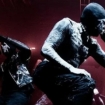It's a tale as old as rock & roll. A band puts out a record that earns them a sizable fan base, they drastically switch up their sound on the next one, and then some OG die-hards feel alienated by the change, of course. But what about the opposite trajectory? What about the bands whose first album had a sound that either wasn't working for them or wasn't earning them many fans, and then after making some adjustments and making their name, they now have this odd starting point that feels kinda out of place with the rest of their catalog? From Judas Priest and Pantera's hard-rock origins to the extreme-metal beginnings of Underoath and Bring Me the Horizon, here are 15 great bands whose debut albums are a far cry from the sound for which they've known and loved.
Avenged Sevenfold - Sounding the Seventh Trumpet
Every Avenged Sevenfold album sounds different than the last, but their 2001 debut is the biggest outlier of the bunch. The O.C. band were only teenagers when they recorded Sounding the Seventh Trumpet, so it's understandable that their creative vision was far from fully formed. Most of the songs are a promising, though often awkward, somewhat schizophrenic hybrid of metalcore and skate-punk that lacks the jaw-dropping technicality of Waking the Fallen and the songwriting savvy of everything that came after. The Rev's drumming on "Darkness Surrounding" — which he recorded in one take, along with the rest of the record — is fucking insane, there are a handful of killer riffs and M. Shadows' blistering screams are mean as hell, but without Synyster Gates and Johnny Christ in the lineup, this feels like proto-A7X.
Beastie Boys - Polly Wog Stew
The raw, destructive energy of "Sabotage" wasn't just convincing cosplay — the Beastie Boys started out as a real-deal hardcore band. In 1982, the soon-to-be hip-hop icons were just a bunch of mischievous kids causing a ruckus on the streets of New York, hanging with punk heroes like Harley Flanagan of the Cro-Mags and getting into music through the burgeoning NYHC scene. Polly Wog Stew, their debut EP, is nothing but a scrappy hardcore project — recorded at Jerry Williams' 171-A studios where the Bad Brains and Antidote cut their crucial early opuses, and released on Rat Cage Records, the short-lived DIY label that's also revered for issuing Agnostic Front's groundbreaking debut, Victim in Pain. The Beastie Boys were right there — and then they weren't, pivoting away from hardcore and changing rap forever.
Bring Me the Horizon - Count Your Blessings
Bring Me the Horizon are another band who've made chameleonic genre-hopping their artistic mission statement. The U.K. lads have morphed from breakdown fiends to pop-metal fusionists to a singular juggernaut who disavow genre altogether, but their 2006 deathcore debut, Count Your Blessings, is a sound they've truly never gone back to. While the record's chug-addled, throat-tearing ragers were actually quite ahead of the deathcore curve, within a few year's time, nearly every aspect of the album became incongruent with BMTH's visionary creative approach. The lyrics are juvenile, the production is horribly muddy, and the songs are as brutal as they are monotonous — an adjective no one, not even the haters, can lob at the band for the uber-dynamic records they've put out from 2010 onward.
Corrosion of Conformity - Eye for an Eye
Corrosion of Conformity have a complicated discography. The Raleigh, North Carolina, band formed in the early Eighties and became one of the first groups in the world to codify the subgenre known as crossover, a blend of punk's sprinting rhythms and barked vocals with thrash metal's complex riffage. Their first two albums, 1984's Eye for an Eye and 1985's much tighter Animosity, are fast and blistering in the way of fellow crossover progenitors like D.R.I. and the Crumbsuckers, but once vocalist-guitarist Pepper Keenan joined the group in 1989, everything from 1991's Blind onward adopted a Southern-fried sludge-metal sound. The band's slower, more rock-based pivot is what launched them onto MTV and into the major label sphere, and that's what most people have associated them with ever since — not the punk-thrash freneticism of Eye for an Eye.
Goo Goo Dolls - Goo Goo Dolls
If you thought the Beastie Boys' hardcore origins are a mindfuck, just wait until you learn about the Goo Goo Dolls. The Nineties radio-rock staples, best known for omnipresent department store ballads like "Iris" and "Name," actually didn't start their career as post-grunge softies — they were a fucking hardcore band. The Buffalo band's 1987 self-titled debut boasts song titles such as "Don't Beat My Ass (With a Baseball Bat)" and "Hammerin' Eggs (The Metal Song)," and its loogie-hackin' sound recalls the juvenile party-punk of Gang Green and the Circle Jerks. There's even a pretty badass cover of Cream's "Sunshine of Your Love" and a decent take on Blue Öyster Cult's "Don't Fear the Reaper" — but none of it suggests that the Goo Goo Dolls would have a grip on soft-rock radio during the flip-phone era.
Incubus - Fungus Amongus
The album is called Fungus Amongus, for fuck's sake. When Incubus found their groove on 1999's Make Yourself, the band's slightly funkier take on Deftones-y alt-metal still had quirky elements, but nothing like the overt goofiness of their 1995 debut. The band members took on pseudonyms for the LP — Brandon Boyd's is Happy Knappy (yes, really) — and musically, the album's pretty overt about its two main influences, the Red Hot Chili Peppers and Mr. Bungle, with Boyd's spastic vocal oscillations between chest-puffing screams and his gifted croon making for an odd dynamic that gets cleaned up significantly on future records. In 2017, Boyd told Kerrang! that "when I hear [the album] I truly cringe. I would just as soon bury it forever." It's not even available on Spotify, so the man is close to getting his wish.
In Flames - Lunar Strain
While Lunar Strain was written, performed and released by a band called In Flames, it doesn't sound like the same band that made The Jester Race, Whoracle and Colony, and earned their spot on melodic death metal's Mount Rushmore. It sounds even less like the Korn-inflected outfit that In Flames have become since. Crucially, frontman Anders Fridén wasn't even in the band yet, so Dark Tranquility frontman Mikael Stanne essentially stepped in as a session musician to fulfill vocal duties, giving the album a much different flavor from the ones that followed. On top of that, melodeath had yet to become a fully-formed style at this point, so the songwriters were pulling from black metal, traditional heavy metal and folk to piece together a tuneful take on extreme-music that just sounds odd within the context of their full discography.
Judas Priest - Rocka Rolla
We all know that Judas Priest are one of the foundational pillars of heavy metal, but for the vast majority of fans, their journey begins with their second album, 1976's Sad Wings of Destiny, and reaches a defining apex on 1980's proto-thrash classic British Steel. However, Rob Halford and Co.'s 1974 debut, Rocka Rolla, is a bluesy, psych-y hard-rock record that's a far cry, both sonically and visually, from the Priest who spearheaded the NWOBHM movement. Not that their imagery has ever been as dark as many of the thrash and death-metal bands they influenced, but Rocka Rolla's cover art, which parodies a Coca Cola bottle cap, has the quaint silliness of a vintage Wacky Package, and its sound, though showing promise, just doesn't hit very hard.
Meshuggah - Contradictions Collapse
Meshuggah's violent quakes, lower-than-hell guitar tunings, obscure time signatures and scabrous vocal shrieks made for such an inventive formula that it took bands roughly 15 years to learn how to rip them off. Today, they're heralded as the progenitors of djent and recognized as one of the most singular bands in metal history, but you wouldn't know that from their first album. The Swedish group's 1991 entry point, Contradictions Collapse, wears its thrash influences on its sleeve, and the band hadn't yet figured out how to incorporate progressive rhythms into their attack. Ironically, the contradictions that make Meshuggah's sound so intriguing — the convulsing grooves that feel like they're trying to burst from inside a death-metal shell — hadn't yet collapsed into one big heap on this one. It's not a bad record, but it isn't quintessentially Meshuggah.
Ministry - With Sympathy
Ministry's first album is called With Sympathy, but that's not the way its creator treats it. For decades, Al Jourgensen notoriously hated his band's 1983 debut, referring to it as "a sonic abortion" in his 2013 book and claiming for many years that its lightweight synth-pop sound — brittle, rosy and inoffensive compared to the twisted industrial metal he's celebrated for — was the result of his label's pressure to conform to New Wave trends. By 2020, it seemed that the ever-eccentric Jourgensen had made peace with it, saying that "without that record, I wouldn't be as much of a fucking maniac douchebag. So I'm thankful for it now." Needless to say, despite its lingering popularity with fans who are just looking for some groovy tunes ("Effigy") to play at their bar's goth night, it's not regarded as part of the Ministry canon.
Nine Inch Nails - Pretty Hate Machine
Pretty Hate Machine is an outlier on this list for being a debut record that was actually a commercial success — which might have something to do with the fact that it sounds almost nothing like anything else Nine Inch Nails have ever made. Compared to the druggy, tortured, spiky sculptures of metalized noise that the band would begin making in the early Nineties, and even the run of ambient and experimental electronic creations they unveiled throughout the 21st century, Trent Reznor's inaugural LP can be described as shimmering, colorful and even sweet-sounding at some points. Standout "Head Like a Hole" has a metallic crunch to its chorus, but most of the record is closer to synth-pop and the other industrial staples of its era, not the challenging, clamorous music that Reznor would make in years to come.
Opeth - Orchid
Opeth have always sounded like no other band, but their 1995 debut sounds like no other Opeth record. The Swedish group helmed by vocalist-guitarist Mikael Akderfeldt have been synonymous with progressive death metal — and one of the foremost proggy metal bands — since the turn of the millennium, when they began releasing a string of exceptional records that pushed the boundaries of extreme music by daring to find ornate harmony between thunderous heaviness and beguiling beauty. They were a prodigious unit from the get-go, but Orchid is a bizarre conglomerate that lumps together various strains of extreme metal with folk, classical, dark ambient and other elements in a way that doesn't congeal effortlessly like their later work, and includes elements of black metal that they would soon abandon. Simply put, it doesn't sound anything like Blackwater Park.
Pantera - Metal Magic
If the name Pantera wasn't so fucking awesome, it would've made sense for the band to change it once they found their groove in the Nineties. The Texas group's 1983 opening salvo — and the three records after it, for that matter — is almost entirely unrecognizable from the pioneering mosh music they'd eventually become legends for. Metal Magic does feature three quarters of the iconic Pantera lineup — the Abbott brothers, guitarist Dimebag Darrell (then Diamond Darrell) and drummer Vinnie Paul, and bassist Rex Brown — and you can clearly hear that these guys have talent, but the music itself is down-the-middle hard-rock à la KISS and Van Halen. It wasn't until Philip Anselmo joined the band and pushed his vocals in a more hardcore-punk direction that they started sounding like the Cowboys From Hell taking over your town.
Underoath - Act of Depression
Underoath are one of the most important bands in metalcore history. Their run of albums from 2004's They're Only Chasing Safety through 2008's Lost in the Sound of Separation were hugely important for codifying the blend of emo-tinged clean hooks, crushing breakdowns and spiritual lyricism that defined the genre at the time and in the years that followed. From the 2010s to now, their sound has ebbed and flowed between crushing and catchy, but they've never come within a 10-mile radius of sounding like their 1999 debut, Act of Depression. Drummer-vocalist Aaron Gillespie is the only current member who played on that LP, which features two 10-minute songs and clocks in at nearly an hour. The sound is a lo-fi jumble of metalcore, death metal and black metal that's undeniably heavy, but totally unrecognizable as Underoath.
White Zombie - Soul-Crusher
White Zombie made four full-lengths in the time they were active, but the group are defined by their last two, 1992's groove-metal breakthrough, La Sexorcisto: Devil Music Volume One, and 1995's industrialized Astro-Creep: 2000. The first two, particularly their 1987 debut, Soul-Crusher, are better remembered for the contrast they provide to the band's later work than they are for their own music. Rob Zombie and bassist Sean Yseult's creation grew out of the New York City noise-rock scene that was metastasizing during the mid-Eighties, and Soul-Crusher sounds like a product of their surroundings — dilapidated buildings, cheap instruments, and young eccentrics pushing boundaries with violent volume and formless songwriting. Introducing anything on Soul-Crusher to a fan of "Thunderkiss '65" is a recipe for confusion.












